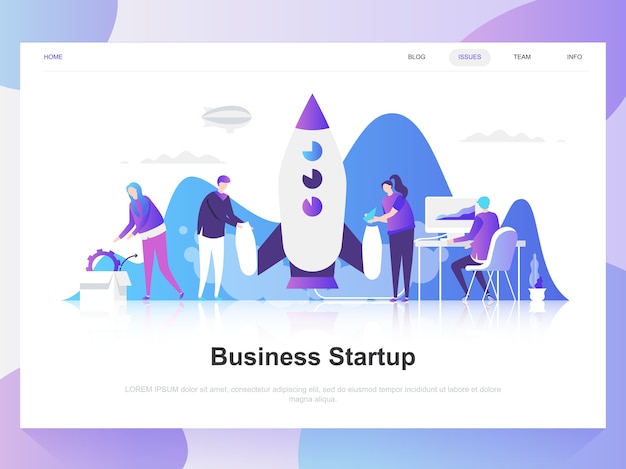Master the art of building a thriving business in just five minutes: A guide that simplifies years of wisdom.
A concise primer for those keen on establishing their own business.
This article serves as a roadmap for individuals embarking on their entrepreneurial journey, who might feel inundated and unsure of where to start. The aim is to distill key insights and fundamental principles necessary for launching your business.
While there are more comprehensive articles on this site that delve deeper into each of these stages – offering more insights on the steps to establish a business – this article is designed for those who seek a broad understanding of the essential steps to kickstart a business.
Conceptualizing and validating your business proposition
 The journey begins with a business concept. You might require assistance in conceptualizing the idea, ensuring it aligns with your personal interests and market needs.
The journey begins with a business concept. You might require assistance in conceptualizing the idea, ensuring it aligns with your personal interests and market needs.
Once you’ve conceived an idea, the next step involves assessing its potential viability for you.
I interact with numerous entrepreneurs daily who have promising ideas, but they might not be the best fit for the individual founder.
Consider a 19-year-old who aspires to start his own gaming laptop manufacturing company, but lacks the necessary knowledge, funds, and business background. The gap between the founder’s capabilities and the requirements of the business is vast, making it a highly ambitious endeavor. 🙁
It’s crucial that the business proposition aligns well with your skills, interests, and expertise.
The business idea needs to be feasible for you. Do you have the necessary funds? Do you possess the required skills? Do you have the relevant background?
Here are some critical questions you should ask yourself:
- Is there a demand for my product or service?
- What is the size of that market?
- Do I have a strategy to reach that market and showcase my business?
- What is the level of competition?
- Will this business yield sufficient profits to fulfill my financial needs?
- What are the financial prerequisites to get started and can I arrange the necessary funds?
- Do I possess the skills and experience required to succeed?
- Are there any legal or regulatory hurdles?
Performing market research to evaluate demand and competition
 Once you have a business idea, it’s time to conduct further research and groundwork to determine if it’s worth dedicating a few years of your life to.
Once you have a business idea, it’s time to conduct further research and groundwork to determine if it’s worth dedicating a few years of your life to.
You’ll need to conduct market research, devise a practical marketing plan, and strategize your sales approach.
A crucial aspect to consider is whether the business has the potential to generate enough revenue to keep you satisfied.
I recommend using a basic financial projection (refer to the template at the link). This is a straightforward spreadsheet calculator that provides an estimate of your business’s potential revenue and profit over six months, 12 months, and 24 months – it’s a good starting point.
One of the key reasons for this is that sometimes you find it’s challenging to turn a profit based on your idea, perhaps because your operational costs or product creation costs are too high for the price you think you can charge.
Or perhaps you don’t think you can sell enough to generate a profit – but this basic financial projection will allow you to assess whether the profits you need should be achievable or not.
Validating your idea – a step of paramount importance
This is a crucial step that many entrepreneurs overlook – but it’s one you should pay close attention to 🙂 ! Ensuring that your business idea appears to be robust can make the difference between investing your time and energy into a potential success or a probable failure.
Imagine this. You’ve got a business idea that you’re passionate about. You’re ready to dive in headfirst and put in the hard work (like most founders).
But what if the idea isn’t as promising as it seems? What if the market doesn’t need, or want, your product or service?
By validating your business idea, you can answer these questions before you invest significant resources.
That’s the advantage of validation. It provides an opportunity to confirm your idea, ensuring it has a real market and genuine demand.
But how do you validate your business idea? Broadly, it involves collecting and analyzing data. You’ll want to understand your potential customers, competitors, and market conditions. There are several ways to do this, including surveys, market research, and even launching a minimal viable product (MVP).
We have a variety of resources available to assist you with this critical step. For instance, our post on how to effectively validate your business ideas is a great starting point. Additionally, our guide on how to conduct a successful focus group test can help you gather valuable consumer insights.
Remember, validating your idea can save you from years of working on a venture that’s destined to fail.
Identifying your target audience and customer persona
The next step involves identifying your target customer.
And when I say specifically – I mean it – is this a man, a woman, a teenager, how old are they, where do they live, what are their behaviors? Are they sports enthusiasts? Shopaholics? Tennis players? Luxury car owners? What are their needs and objectives? What cultures do they belong to, etc.?
All these factors are important and help you gain insight into who exactly your customer is so that you can identify where you might find them.
Of course, the ultimate goal is to be able to communicate your value proposition to your customer so that they can decide whether to purchase your product.
Before we can communicate with the customer, we need to know where they are. So, understanding all their attributes helps us know where to look to communicate with these people, our future customers.
Developing a business plan and financial projections
Developing a business plan is a crucial part of the planning process, and it doesn’t need to be as daunting as many people perceive.
I recommend a concise business plan of 1 to 2 pages at the outset while you’re assessing the viability of your business idea and whether you should proceed with it and actually establish the business.
If you can pass all those viability tests, validate the idea on some level, receive positive feedback from potential customers, and determine their interest in your product, then you should probably proceed to a more traditional, longer form business plan. Typically, this is a more detailed document, around 20 to 30 pages long.
The most important function of a business plan is to compel the founder to confront the answers to numerous critical questions about the business, such as strategy, marketing plan, sales plan, strengths, weaknesses, competition, funding sources, funding duration, etc.
Yes, it takes some time to go through all of this, but if you’re going to encounter any major obstacles, it’s better to discover them now rather than later, after you’ve spent 6 to 12 months and perhaps a significant portion of your savings working on a plan.


